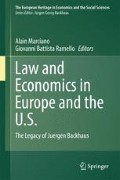Abstract
The U.S. is a regulatory state where major industries and firms throughout the economy are subject to extensive command and control regulation. Put another way, America is an entangled economy where concepts of seperate private from public enterprises and occasional intervention to affect market outcomes no longer apply. There is regulation at every margin. Drawing on the Bootlegger/Baptist theory, this chapter seeks to explain how special interest group demand for command-and-control regulation, as opposed to other forms of regulation, such as the use of performance standards and economic incentives, has accommodated and reinforced the rise of the regulatory state. The chapter traces the evolution of regulation theory to the present and then provides evidence on the rise of regulation and its effects.
The authors are Associate Director of Research at the Center for Politics & Governance and Lecturer at the Economics Department, University of Texas at Austin and Dean Emeritus, College of Business and Behavioral Science, Clemson University and Distinguished Adjunct Professor of Economics, Mercatus Center at George Mason University, respectively.
Access this chapter
Tax calculation will be finalised at checkout
Purchases are for personal use only
Notes
- 1.
The ideas in this section originated in Shamoun (2013).
- 2.
People love to drink even though it may offer no material profit; people love to cash checks from their ownership stake in coal-powered electric plants, even though it may offer no psychic benefit.
- 3.
Baptists may be said to use threats/coercion, but not directly. They would refer to eternal damnation, or to catastrophic damage to the environment, or depletion of resources, etc., but these are always external theoretical threats and come as the result of having performed the activity itself, not threats of arbitrary force here and now with the purpose of preventing the activity from taking place.
- 4.
RegData is available at http://regdata.org.
- 5.
This conclusion is adapted from a line by Anthony de Jasay (1985, 7) in The State: “It seems to me almost incontrovertible that the prescriptive content of any dominant ideology coincides with the interest of the state rather than, as in Marxist theory, with that of the ruling class. In other words, the dominant ideology is one that, broadly speaking, tells the state what it wants to hear, but more importantly what it wants its subjects to overhear.”
References
Ackerman, Bruce, and William T. Hassler. 2008. Clean Coal, Dirty Air. Cambridge: Harvard University Press.
Adler, Jonathan, Andrew Morriss, Roger Meiners, et al. 2013. Bootleggers, Baptists and E-Cigs. Regulation. 38(Spring): 30–35.
Bernstein, Marver. 1977. Regulation by Independent Commission. Princeton: Princeton University Press.
Bongiorno, A. 1930. A study of Pareto’s treatise on general sociology. American Journal of Sociology: 349–370.
Boudreaux, Donald J., and A.C. Pritchard. 1994. The Price of Prohibition. Arizona Law Review 36: 1–10.
Brito, Jerry and Susan E. Dudley. 2012. Regulation: A Primer, 2nd edition. Fairfax, VA: Mercatus Center at George Mason University.
Buck, Stuart, and Bruce Yandle. 2002. Bootleggers, Baptists, and the Global Warming Battle. Harvard Environmental Law Journal 1(26): 177–229.
Bueno de Mesquita, Bruce, and Alastair Smith. 2012. The Dictator’s Handbook: Bad Behavior Is Almost Always Good Politics. New York and London: Public Affairs.
de Mesquita, Bueno, Alastair Smith Bruce, Randolph Siverson, et al. 2004. The Logic of Political Survival. Massachusetts: The MIT Press.
Davies, Antony. 2014a. More-Regulated Industries Experience Lower Productivity Growth. Mercatus Center at George Mason University. http://mercatus.org/publication/more-regulated-industries-experience-lower-productivity-growth.
Davies, Antony. 2014b. Regulation and Productivity. Mercatus Center at George Mason University. http://mercatus.org/sites/default/files/Davies_Regulation&Productivity_v1_0.pdf.
de Jasay, Anthony. 1998. The State. Indianapolis, IN: Liberty Fund.
Jacobs, Jane. 1993. Systems of Survival: A Dialogue on the Moral Foundations of Commerce and Politics. New York: Random House.
Kolko, Gabriel. 1963. The Triumph of Conservatism: A Reinterpretation of American History: 1900–1916. Chicago, Ill: Quadrangle Books.
McCormick, R. E, and R. D Tollison. 1981. Politicians, Legislation, and the Economy: An Inquiry into the Interest-Group Theory of Government. Boston; Hingham, Mass. In Distributors for North America, ed. Nijhoff, M. Boston: Kluwer.
Mencken, H.L. 2009. Little Book in C Major. South Carolina: Biblio Bazaar.
Pigou, Arthur C. 1920. Economics of Welfare. London: Macmillan and Company.
Shamoun, Dima Y. 2013. The Propensity to Truck, Barter, and [impede] Exchange: Democracy the Unknown Ordeal (Doctoral Dissertation, George Mason University). Retrieved from http://digilib.gmu.edu/xmlui/bitstream/handle/1920/8756/Shamoun_gmu_0883E_10516.pdf?sequence=1&isAllowed=y.
Smith, Adam. 1982. An Inquiry Into THE Nature and Causes of the Wealth of Natilons. Indianapolis: Liberty Fund.
Smith, Adam, Richard Wagner, and Bruce Yandle. 2011. A Theory of Entangled Political Economy, with Application to TARP and NRA. Public Choice 148: 45–66.
Stigler, George J. 1971. The Economic Theory of Regulation. Bell Journal of Economics & Management Science. 1: 3–21.
Wagner, Richard. 2009. Property, state, and entangled political economy. In Markets and politics: Insights from a political economy perspective, eds. Wolf Schäfer, Andrea Schneider, and Tobias Thomas, 37–49. Marburg: Metropolis.
Walsh, Bryan. 2012. How the Sierra Club Took Millions from the Natural Gas Industry—and Why They Stopped. Time, February 2. http://science.time.com/2012/02/02/exclusive-how-the-sierra-club-took-millions-from-the-natural-gas-industry-and-why-they-stopped/.
Yandle, Bruce. 1983. Bootleggers and Baptists: The Education of a Regulatory Economist. Regulation, 12–16.
Yandle, Bruce. 2010. National TV Broadcasting and the Rise and Decline of the Regulatory State. Public Choice 142(March): 339–353.
Yandle, Bruce. 2013. How Earth Day Triggered Environmental Rent Seeking. The Independent Review 1(18): 35–47 (Summer 2013).
Yandle, Bruce, Andrew P. Morriss, Andrew Dorchak, and Joe Rotondi. 2008. Bootleggers, Baptists and Televangelists. University of Illinois Law Review 4: 1225–1284.
Author information
Authors and Affiliations
Corresponding author
Editor information
Editors and Affiliations
Rights and permissions
Copyright information
© 2016 Springer International Publishing AG
About this chapter
Cite this chapter
Shamoun, D.Y., Yandle, B. (2016). Bootleggers and Baptists in the Garden of Good and Evil: Understanding America’s Entangled Economy. In: Marciano, A., Ramello, G. (eds) Law and Economics in Europe and the U.S.. The European Heritage in Economics and the Social Sciences, vol 18. Springer, Cham. https://doi.org/10.1007/978-3-319-47471-7_3
Download citation
DOI: https://doi.org/10.1007/978-3-319-47471-7_3
Published:
Publisher Name: Springer, Cham
Print ISBN: 978-3-319-47469-4
Online ISBN: 978-3-319-47471-7
eBook Packages: Economics and FinanceEconomics and Finance (R0)

